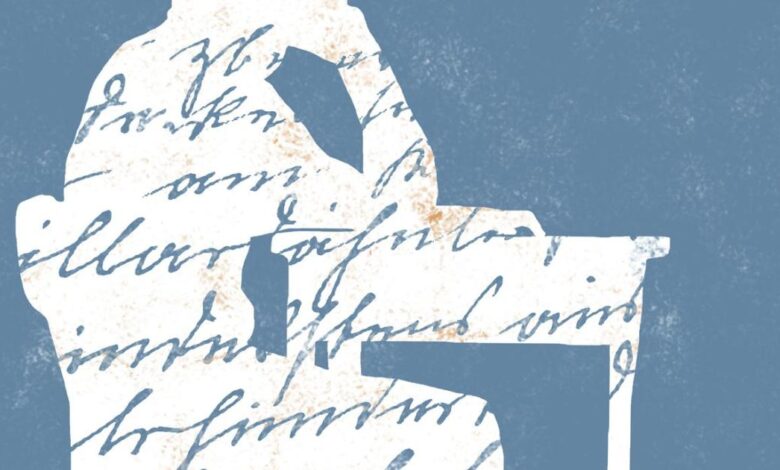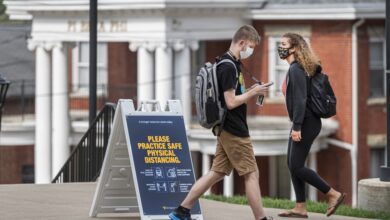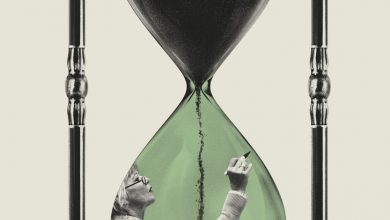Professors Are Being Trained to Spot Signs of Mental-Health Distress

[ad_1]
In a Zoom classroom in late August, seven professors, staff members, and students muted themselves and practiced saying the words they almost certainly hope they’ll never have to use: “Are you thinking about killing yourself?”
The instructor, Kathleen Bartolini, told them to keep their tone casual, as if they were asking, “What did you think about that meeting?”
But Bartolini, a retired clinician and “adjunct by design” at Northern Essex Community College, in Massachusetts, knows that’s a tall order.
“I’ve never been able to have that conversation without my heart pounding,” she said.
Even before the pandemic, professors were playing a growing role in recognizing and responding to students’ mental-health challenges. “Gatekeeper trainings” were multiplying, and faculty members were adding mental-health statements to their syllabi encouraging students to reach out if they needed help.
But online learning, which reduced students’ interactions with staff and peers, turned many professors into mental-health first responders. Stressed and worried students, confined to their dorms or childhood homes, confided in their professors more than ever.
In a survey conducted in early 2021, roughly 80 percent of the 450 faculty members who responded said they had conducted one-on-one conversations with students in the past year about mental health and wellness. An even greater percentage said they thought students’ mental health had somewhat or significantly worsened during the pandemic.
Yet that same survey showed that many faculty felt ill-equipped to support their students. Just over half said they knew how to recognize that a student was in emotional or mental distress, and fewer than 30 percent said they’d participated in a gatekeeper-training program. Over 60 percent said such training should be mandatory.
Do brief, targeted trainings. Talk to them about what they’re going to see in their slice of life.
Faculty and staff members who have participated in Northern Essex’s Mental Health First Aid training say it made them more comfortable approaching students and colleagues with their concerns. Some said they’ve already put the practices to use in their personal lives.
Scott Joubert, a criminal-justice professor, said that shortly after completing the course he had to confront his own teenage daughter about whether she was considering suicide. (She was.)
“I went into reaction mode,” said Joubert. “Everything we learned in training was exactly what I did.”
Research shows that people who complete Mental Health First Aid and other gatekeeper-training programs are better able to identify the signs and symptoms of psychological distress, discuss their concerns with the troubled individual, and refer them to help.
For colleges, gatekeeper training can be a way to both prevent tragedy and manage institutional risk. The programs can also increase retention and graduation rates, by getting more students help with their personal and psychological challenges before they drop out.
College counseling centers have been strained: Rates of depression and anxiety among college students have been on a steady climb, reaching a record 47 percent last year, according to the latest Healthy Minds survey. Thirteen percent of students in that survey reported having suicidal thoughts in the prior 12 months, and 6 percent said they’d made a plan to kill themselves. One percent said they’d attempted suicide.
Yet not everyone is convinced that daylong trainings focused on crisis response are the best way to prepare faculty and staff members to meet the mental-health needs of students. After all, most instructors are busy, and most struggling students aren’t suicidal.
While training faculty members to spot students who are at risk of suicide is important, “the vast majority of students are not experiencing crisis,” said Laura Horne, chief program officer at Active Minds, which supports mental-health awareness and education for students. These students don’t need an intervention, they need “empathetic, active listening skills” that can be taught in a faculty meeting, she said.
“Training can be quick and responsive to what faculty are most likely to see” in their jobs, she said.
A Crowded Market
There is no shortage of gatekeeper-training programs on the market. The Suicide Prevention Resource Center lists more than two dozen in its guide to choosing a program, including two that are tailored to the college population: Campus Connect, which was developed by Syracuse University, and Kognito’s At Risk, which lets users interact with virtual students. Each are in use on nearly 200 campuses.
Several of the programs train employees to teach the course; others are self-paced and fully online. Many let participants practice conversations with imagined people in distress.
Pricing varies and is sometimes pegged to the number of potential participants. The Mental Health First Aid instructor-training course ranges from $2,000 to $3,000 per person, but course participants — or their employers — typically pay only a $25-per-person materials fee. Campus Connect charges a flat fee of $5,000 to train up to 25 future trainers, while Kognito offers institutional licenses starting at $5,313, with higher prices for larger institutions.
It can be scary to think, ‘I’m taking this training, and now I’m certified in mental-health first aid.’
The Jed Foundation, which works with colleges to evaluate and strengthen their mental-health and suicide-prevention efforts, charges colleges that aren’t part of the nonprofit’s program $1,500 for its You Can Help a Student slide deck and conversation guide.
At least one program — I Can Help — offers its materials free to all colleges, though institutions can choose to pay for a training event. Representatives of more than 100 colleges have attended I Can Help trainings, which start at $6,000 for an unlimited number of participants, and at least 200 institutions have used the materials, according to Brian Mistler, a former college counseling director who developed the program.
While some of the commercially available trainings span a day or more, others run shorter than an hour and can be watched on demand. All include an element of suicide prevention, but some are broader and spend most of their time on sub-crisis scenarios.
When choosing among them, colleges should consider sustainability, Mistler said. If a program has a recurring licensing fee that the college can’t cover, it’s unlikely to have much of an impact. Likewise, if the college can afford to train only a couple of employees, it could be left in the lurch if those employees leave.
“I’ve seen so many campuses get a grant, bring in a training, and then not be able to afford to pay for new training as they have staff turnover once the grant ends,” Mistler wrote in an e-mail. “The only good gatekeeper program is one you keep using.”
Case in point is the University of North Carolina at Chapel Hill, one of the most enthusiastic adopters of the Mental Health First Aid program. The university used a federal grant to hire a full-time trainer in 2015, and has trained close to 3,000 employees and students since then. But with a second grant about to expire, and the trainer recently departed for personal reasons, the program is on pause, its future uncertain, according to Tara Bohley, the clinical associate professor who brought it to the university.
Bohley is hopeful that higher-ups will find the money to continue the program. Demand for the course is high, with a current wait list of a couple hundred, she said.
Meanwhile, some mental-health advocates said they would like to see more colleges develop homegrown programs, like those created by Appalachian State University and the University of Minnesota.
“It’s much easier to buy something off the shelf,” said Nance Roy, chief clinical officer at the Jed Foundation. “But when you look at the percentage of people who do” the training, “it’s pretty low,”
In the faculty survey, respondents said they preferred trainings that were online; offered advice for general student support instead of just crisis training; were self-paced; and were less than 30 minutes long.
Roy suggests that colleges customize their trainings to different audiences — be they faculty members, coaches, or security staff.
“Do brief, targeted trainings,” she said. “Talk to them about what they’re going to see in their slice of life.”
It ‘Doesn’t Make You a Therapist’
But time constraints may not be the only reason fewer than a third of faculty members have participated in gatekeeper-training programs, Horne said. Another factor may be a reluctance to be seen as an “expert” on student mental health.
“It can be scary to think, ‘I’m taking this training, and now I’m certified in mental-health first aid,’” she said.
When Jennifer Mezquita, vice president for student affairs at Northern Essex Community College, was approached about attending a training in 2019, her first reaction was, “Are you going to make me a counselor?” she recalled.
That’s a common misconception that Bartolini tries to dispel early in her training sessions.
“Just like taking a CPR course doesn’t make you a cardiologist, taking mental-health first aid doesn’t make you a therapist,” she said at the outset of the August class.
Bartolini also stresses that professors aren’t expected to be superheroes. They can choose not to intervene if they believe someone else would be more qualified to do so.
“I’m handing out certificates today,” she said. “I’m not handing out capes.”
Before logging on to Zoom that day, participants had taken a two-hour online course that introduced them to mental-health first aid and the signs and symptoms of various mental illnesses. Over the next six hours, they learned how to differentiate among early, worsening, and severe cases, and how to apply the “Algee” action plan: Assess for risk of suicide or harm; Listen nonjudgmentally; Give reassurance and information; Encourage appropriate professional help; Encourage self-help and other support strategies.
For many participants, the second and third steps — the L and G — are among the hardest, Bartolini said. Truly listening is difficult, and being nonjudgmental “does not come naturally to humans.” Doing both together takes practice.
It can also be hard to overcome the urge to give advice, rather than just information, she said.
Once the participants had learned the five steps, they practiced applying them to scenarios shown in video vignettes and described in case studies, breaking into small groups to discuss how they might respond.
For Joubert, who spent 15 years as a corrections officer in a local county jail, it was the opportunity to practice the skills that distinguished the college’s course from the more didactic gatekeeper trainings he’d attended in his prior job.
“They didn’t have role-playing — it was ‘get out there, and good luck,’” he recalled. “Kathleen allowed us to ask questions and dig deeper into what you might say.”
More than 2,000 instructors with .edu addresses have been trained in the Mental Health First Aid program, and more than 330,000 college-affiliated individuals have taken a version of the course. Mezquita, who supervises 100 employees, said it gave her the courage and confidence to approach her colleagues when she has concerns about their mental health.
“I’ve been in positions where I noticed a change in an individual but didn’t know what to say,” she said. “Now, I’m not scared.”
For Theresa DeFranzo, an adjunct English professor who took the course over the summer, the training was a reminder of the unseen challenges that many of her students face, particularly amid a continuing pandemic. This fall, she’s relaxed her strict attendance policy and become more flexible about deadlines. Instead of penalizing students for missing classes or turning assignments in late, she urges them to come to as many classes as they can and gives them a couple of days’ grace for late work.
“I can’t solve the problem, and I certainly can’t diagnose it, but there are little things I can do to give the students some breathing room so they can stay in school and graduate,” she said. “And that’s the ultimate goal.”
But the Jed Foundation’s Roy is skeptical that gatekeeper training will reach a critical mass of faculty unless colleges make it mandatory, much like training to prevent sexual misconduct.
“My guess is that there are a lot more students struggling with mental-health issues than those who are sexually assaulted or harassed,” she said. “Until it’s required, I don’t know if we’ll get a big group doing it.”
[ad_2]
Source link






